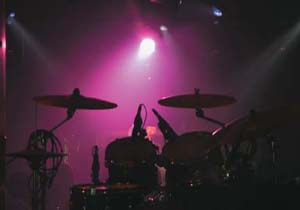 |
 |
| current issue |  |
past issues |  |
send a letter/news |  |
address update |  |
advertise |  |
about us |  |
alumni home |
Features
All Music, All the TimeThe halls are alive with the sounds of music
by C.W. Wolff
Photos by Perry Smith
Walking down the narrow hall on the third floor of Paul Creative Arts Center is like flipping a radio dial and finding that music has trumped talk shows on every station. The escalating warm-up scales of a soprano give way to flute trills, followed by halting--but persistent--piano chords and then a saxophone jazz riff. You want to close your eyes to better absorb this amazing cacophony. But if you do, you might trip over a student camped out in the hall waiting to use one of 13 tiny practice rooms. Go down a flight of stairs or two, and you find the same--music leaking from behind almost every door.

|
Performance is central to the music department, even though two-thirds of its students are music education majors. "We think good music teachers ought to be good musicians, first and foremost," says Mark DeTurk, professor and department chair. The number of events held in the department each year is staggering. This year's calendar lists 71 events, including 54 student performances and 13 faculty concerts. Add to that scores of student recitals and juried performances, and you have music, if not 24/7, at least 12/6.
It was a much slower beat in the 1980s, when college music programs across the nation suffered as public schools slashed their music budgets and, consequently, the music major's job prospects. At UNH, there were as few as 70 music majors at one time, making it difficult to even muster a quorum for ensembles. Today there are 180 majors and 200 non-majors enrolled in music classes.
Enrollments began to grow in the 1990s with the arrival of new faculty, creation of new scholarships, and the continued expansion of outreach and early recruitment programs. The 61-year-old Summer Youth Music School, for instance, was attended last year by 800 middle and high school students.
Another attraction is a strong sense of community. Unlike many music programs, says DeTurk, there is little breaking down into camps, such as instruments vs. voice or classical vs. jazz. That's a good thing, since the demand for space could easily come to blows in a less amiable atmosphere. "We really need a new building," says David Ripley, a professor of voice. Others agree. "It's not as much more space, as different space--performance space--that we need," says DeTurk. Even so, faculty and students are deeply loyal to the program and mutually supportive. Students often call their performance professors by their first names and faculty routinely make time for extra lessons and lend their office keys to students for late-night practicing. As Ripley notes: "There's a sense of unity here; a strong connection about what the conversation is."
Page: 1 2 3 4 5 Next >Easy to print version
blog comments powered by Disqus
